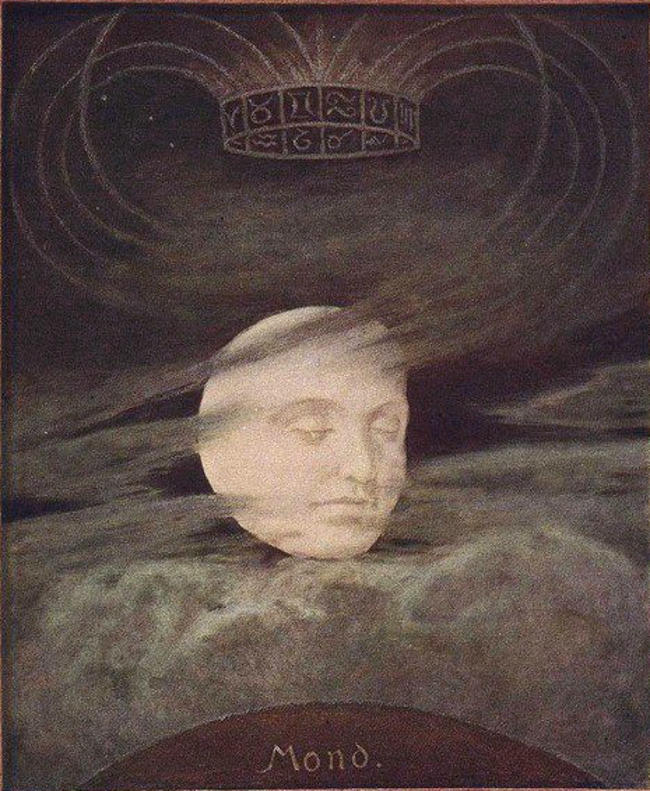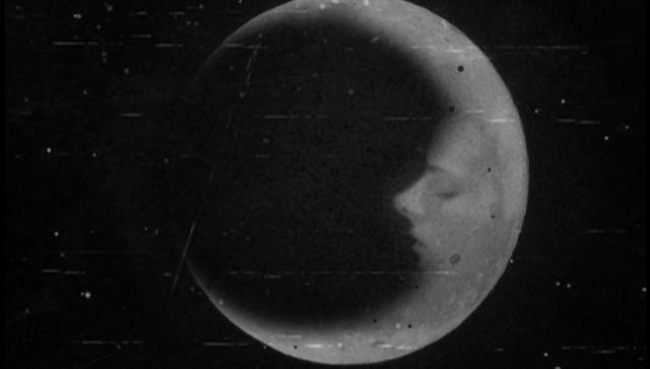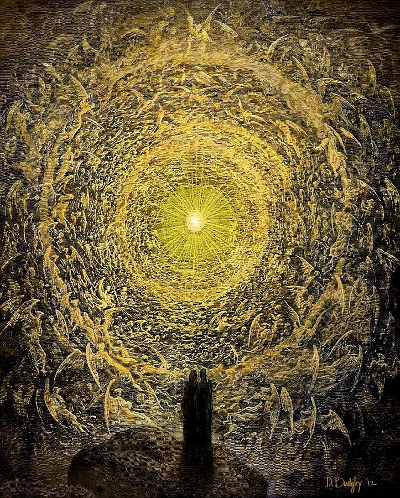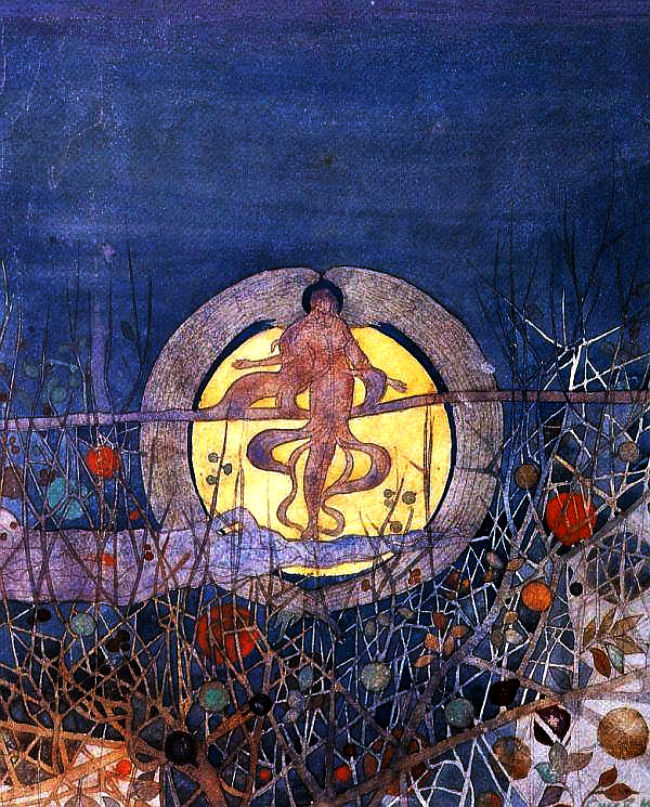It looks like you're using an Ad Blocker.
Please white-list or disable AboveTopSecret.com in your ad-blocking tool.
Thank you.
Some features of ATS will be disabled while you continue to use an ad-blocker.
share:
The 8th Sphere

Prologue
“Paradoxically, the ability to be alone is the condition for the ability to love.”
― Erich Fromm
Each person, at one point in their lives, experiences a period of loneliness. Isolated in the black vacuum, we are sealed in a sphere which other humans can ultimately never penetrate. Some terrible night will find us sleepless, locked within our minds, turned inward away from the world only to despair at the appalling insufficiency of the naked self. The faces of loved ones lose their clear lines, all our faults are laid utterly bare, the eternal presence of death is unveiled to us and the stark fact of time leaches every drop of meaning from our lives.
In those moments, for however as long we hang suspended in our own desolation, we belong to the Moon.

The Russians
Near the end of the 19th century, A. P. Sinnett packed up his household and relocated to India to pursue his interest in Theosophy. Steeped in occult lore and an esteemed member of several magical societies, he had been in contact with Helena Blavatsky prior to securing a position as the editor of the country’s leading English newspaper. Blavatsky and Crew attached themselves to Sinnet immediately upon his arrival, and sponged off him at his estate for weeks. Soon, Sinnet and his wife began to receive what would become known as the Mahatma Letters.
Before we get ahead of ourselves, an introduction is necessary. Let’s line up some of our main characters and a little pertinent info to make this go more smoothly. Blavatsky was Russian, so was Gurdjieff, and so was a prominent student of Gurdjieff, one P.D. Ouspensky. Go ahead and keep that in mind in conjunction with the idea that “Knowledge”, as it has developed in the West, flows to us in an uninterrupted course from the Greeks; the route is continuous, but at times quite circuitous. A lot of stuff happened along the way, like a couple of dark ages and Church schisms and the such.
Back on track. So, at some point in the 1890’s, a wave of Buddhist sentiment provoked a schism in Blavatsky’s “Society”. Before her death in 1891, her best partner, Olcott, was already playing Buddhist evangelist to the colonists. And then enter Sinnet, with his publication of the book Esoteric Buddhism two years after her death in 1893. In that book, Sinnet gives up a secret from the Mahatmas that caused a raging #storm during its time. If you imagine the strongly secular conditions under which Blavatsky’s Theosophical Society developed, and also the ideological quarantine imposed by distance, you might be shocked to learn that the impact of Sinnett’s “leak” was felt all the way back in America in the non-secular Christian world.
You want in on the secret? Here’s the short of it: Sinnet let everyone know that we are in a bad relationship with the Moon, which is called the Eighth Sphere, or at least a relationship that may have suited us at one time but may no longer suit us; that’s probably more expedient than calling it evil. Anyhow, story has it that based on some long forgotten catastrophe, the Moon has parked itself here and entered into a dynamic relationship with the earth and its denizens. All of them. It feeds on us. As Ouspensky repeated, “Everything that dies, from bacteria to man, then divides in two. One part of its organism remains on earth and enters in earth and produces many different effects on the surface of earth; and the other part is attracted by moon and feeds moon. So part of us, when we die, feeds moon—but not only man—all organic life also.”

Gurdjieff told that to Ouspensky, and Gurdjieff (“G”) was famous (infamous?) for saying, “We are all food for the Moon”. He tried to use group synchronized-dance to combat its powers, and we will eventually speculate on why he thought that might be effective. So, until then, we’d like to ask, 1: how G and Blavatsky got this Moon knowledge that they worked into their personal narrative versions of The Mysteries, and, 2: why I will shortly introduce western thought, or Western Philosophy and the Greeks amongst all this. Before we crack into that, it is important to add that Sinnett offered up the secret of the 8th sphere framed by, you guessed it, what he called Esoteric Buddhism. Later, Rudolph Steiner really tried to sum it all up, and he did an entertaining job, but for the purposes of this pedagogic rant, we are going to stick with The Russians, G and Blavatsky.
Why did the Russian crew talk about this? I don’t know. It could have been as simple as stuff “they” read versus stuff “we” read; Russia really is the East, after all. My personal best guess is that the idea of the 8th Sphere entered into the common stream of European occultism by way of the Picatrix. The Picatrix is a Grimoire that teaches a person how to make talismans based on what we would today term “Astro-Theology”. Picatrix refers to the Mansions of The Moon and their beginnings in the Eighth Sphere of fixed stars and attributes a helluva downside of Aries to the entrance to their domain. It is the realm dedicated to interminable, perilous journeys full of wrong turns and bad endings, lost forever amongst the tracts of Mansions on the Moon. Picatrix was written in Arabic in the 11th century and translated in to Latin in the 13th century, and that will eventually take us to some Greek and Sufic Philosophy, but not quite yet.
continued by Eidolon23...
edit on 2-12-2013 by Bybyots because: . : .
A Tale of Two Moons...

"The moon, our own, earthly moon is bitterly lonely, because it is alone in the sky, always alone, and there is no one to turn to, no one to turn to it. All it can do is ache across the weightless airy ice, across thousands of versts, toward those who are equally lonely on earth, and listen to the endless howling of dogs."
― Yevgeny Zamyatin
The Moon Is A Harsh Mistress…
Narrative is more important than the thumb. The thumb is merely an accessory appendage that works as a peripheral device to our story-making ability (super-power, really). If you take a look at the stories that form the cornerstones of our society, the stories from great American Literature, for instance, you might find it interesting to try and see them as representing problems that we are trying to solve. The reason that the great stories resonate with us all is because they reflect problems that are common to all of us, as individuals and as nations of people. As with all stories we are trying to solve something here with this story about The 8th Sphere and the Moon. When stories persist as some do, and are spread over a wide geography, it usually means we are collectively working on really big stuff. Here is one version of a version of the story in question.
As you will see, this particular story crops up everywhere, reflected in modern movies like Dark City and The Matrix, and in themes explored by the likes of P.K. Dick. If you know that one, substitute The 8th Sphere for Dick’s concept of the VALIS system.
The story tells that the corporeal Moon, as we see it, is a physical ‘remnant’, a shell, of what is “spiritually” evolving into a planet: namely, what the Mahatmas told Sinnet is called “The Planet of Death”. This evolving part is invisible, and much larger than the Moon, and its “field” of influence and control encompasses the Earth. Later, other authors such as R. Steiner and David Ovason elaborated on this tale. Steiner reinforced what Sinnett said and also emphasized that the purpose of the 8th Sphere is to harvest the souls of mankind by acting as a sort of “cul-de-sac” leading away from the Sun and casting them into an endless loop of deep spiritual isolation known as Avitchi, or Hell.
The method by which the 8th Sphere and its minions, referred to at times as The Shadow Beings, draw a soul into isolation was neatly summed up in a contemporary way by R. Steiner. According to him, whenever a soul expressing the “will to evolve” had that drive subverted to “clairvoyantism”, that right there was the work of The 8th Sphere. In a sort of update from D. Ovason more than 50 years later, he tells us that he was instructed in a tradition which taught that any form of organized efforts based on “clairvoyance”, such as seances and “in other localities and activities wherein human beings attempt to meddle – against the cosmic law – with the lower Etheric planes”, would create “nodes” which feed the Moon, The 8th Sphere, its favorite food, and is the greatest contributing factor to getting splintered off and sent to the Moon, never to return.
Blavatsky’s Story
“The Moon is now the cold residual quantity, the shadow dragged after the new body, into which her living powers are transfused. She now is doomed for long ages to be ever pursuing the Earth, to be attracted by and to attract her progeny. Constantly vampirised by her child, she revenges herself on it, by soaking it through and through with the nefarious, invisible and poisonous influence which emanates from the occult side of her nature. For she is a dead, yet a living body. The particles of her decaying corpse are full of active and destructive life, although the body which they had formed, is soulless and lifeless.”
-Helena P. Blavatsky. The Secret Doctrine
The deepest secrets that Madame Blavatsky taught concerning this story about our real relationship to the Moon tell us that we originated there, and by some accident of attraction, we were “thrown down” to the earth in the rage of our mother’s birth pangs, and that we have been locked in this struggle with her for a very long time. Nothing better illustrates the flux of all poised opposites quite like the moon, with her incremental passage from black to white and back again. However distasteful we may find Blavatsky’s story, the theme seems to be a constant fixture in the work of latter-day teachers trying to push this narrative forward toward a fullness of understanding. It is said that we were dropped to Earth just shy of full-term, that we may have killed her in the birth process, and that we are now locked into a ghastly, mutually cannibalistic relationship with our own Zombie Planet Mom. The real heartbreaker, though, is that on top of it all, we have forgotten her, so the love/hate relationship goes both ways, and neither party can remember why anymore.

Consequently, the Moon, The 8th Sphere (T8S) knows us intimately and uses that knowledge to manipulate our weakest points, the things that we are working hardest on, the things that cost the most when we stumble, in order to extract our spiritual essence so she can grow independent enough to get free of us. Talk about “failure to launch”. It keeps us in a stale circuit; when T8S is working perfectly, the only thing that escapes are the souls that have been absolutely isolated and they go directly to populate the evil protoplanet. “No one here gets out alive”, as one famous food-packet once said, at least that’s the idea.
Which is why it is deeply troubling that Blavatsky, fully aware of this critical information, instructed her aspirants in the very practices that fed the Moon directly in great gulps. Yum. Sinnett had begun writing about The 8th Sphere prior to the 1893 publication of Esoteric Buddhism, and Blavatsky is on record as trying to shut down Sinnett’s “leak”, but she never denied what Sinnett said, only tried to modify it, sparingly and carefully, and then not at all. Her plate was full with other sorts of messes. You have to ask yourself why an organization of any kind that has this knowledge would encourage its “students” or followers, or what have you to engage in the very practices that are bound to isolate them? Also, aren’t they all doing it together, and does that not count as not being isolated? Uhh, generally, no, not in the settings that I have visited, anyway. In my experience I have found the downside of the Moon Mirror to be an equal opportunity employer; just about every group I have ever been involved with, from straight-up Japanese Zen Buddhism to the most deeply western and hermetic and even Christian groups, all have possessed a seething underbelly of sexual turmoil, jealousy, posturing and ideological partisanship that ultimately spelled their demise, at least as they knew it.
continued...
edit on 2-12-2013 by Eidolon23 because: ∇

Let’s take a break and remember for a moment why we keep churning away on this story together. What are we trying to solve? We are, as westerners, usually trying to make our return to The Sun, or The One, Or Goodness. We want to achieve what the Roman philosopher Plotinus called eudaimonia or, True Happiness; in our present secular world that means whatever it happens to mean to each person. Soon we will see how both Islamic and Western philosophers were trying to solve the same philosophical problems often using identical source materials and how it reflects the same story. In that case, philosophers from both east and west are fundamentally trying to escape from Plato’s Cave without A: having their eyes burned out by The Sun, and B: getting their asses kicked to death for having escaped the cave at all; others hate it when their friends are successful, it turns over the apple cart in the worst way. Then everyone’s gotta get off their ass; easier to kill the escapee/prophet of light/doom.
Gurdjieff's Story
In the outrageously arcane (which is a kind way of saying “completely impenetrable”) trilogy of novels entitled, Beelzebub’s Tales to His Grandson, author G.I. Gurdjieff tells us that our planet was subject to a “great calamity” in its far distant past that tore two pieces off of the Earth, one little and one big. The big one we call the Moon, the little one is named Anulios. According to Gurdjieff, mankind is capable of, and in fact sort of “licensed”, to create three fluids that are of a “spiritual” nature; two are mixed together to form a third. The third fluid must feed not only our satellites which are our connection outside of our immediate solar system and beyond to the Megalocosmos, but it must nourish the “higher spiritual vehicles” that we are meant to be growing. Problem is, that it is our nature to be easily turned inward selfishly towards our own aims; and we have been.
What makes matters even worse, Gurdjieff says, is that our case is rare, and we have been gifted with a “set of laws” that allows for us to produce these “fluids”, which as mentioned, are manufactured through “intentional suffering” and “conscious labor”, which Gurdjieff taught that we had forgotten to engage in because of our habit of “falling asleep”.
Gurdjieff makes it clear that we are meant to have an “instinctive knowledge” of our required duty to feed the Moon through “intentional suffering” and “conscious labor”. Intentional suffering may be seen as facing the difficulties of being honest and trustworthy enough to navigate difficult interpersonal relationships, while “conscious labor” likely reflects deeper spiritual truths that may have been characterized by episodes during which Gurdjieff would have his students dig holes for hours in order to teach them ‘”enlightenment”. However you slice it, the fundamental problem is that we have forgotten the “instinctive knowledge” of our obligations to the Moon and we have forgotten Anulios entirely. And so Gurdjieff’s version of the tale says that the Moon and Anulios learned to extract her tribute by other methods, namely by implementing a pogrom of cyclic mutual destruction here on Earth.

What Gurdjieff meant for us all to do to fix this problem often presents a paradox, such as how we are on the one hand meant to get free of the thrall of the Moon while simultaneously nourishing her enough to fulfill our instinctual obligation to one another’s evolution. To my novice eye it appears that, in the scheme of Gurdjieff’s monumental doom-porn, he seemed to emphasize one thing the most: group synchronized dance that functions as some sort of ritual. Almost as if he were trying to find a way for everyone to get to church without going to church; it appears to me as a way to worship together. .
Gurdjieff taught that to escape being Moon Food that we need to create a Moon inside of ourselves (revealing his connections to the Sufis, which we will talk about later), what he would call our own "center of gravity", and then in his usual fashion, he went on to paradoxically prescribe his beautifully orchestrated communal dances. Go figure; and we will try very soon.
continued...
edit on 2-12-2013 by Bybyots because: . : .
Alone In The Crowd
One of the other common threads in this tale, is that the very mechanisms that should serve to unite us are leveraged against us. So it is with clairvoyance. For instance, developing the capacity for telepathy on a species-wide scale may be one of the vital steps in our collective development, and would inevitably lead to a greater sense of mutual understanding and connection. I personally believe that we are already quite “clairvoyant”, and that we likely communicate a great deal “telepathically”. It is said, after all, that some 90% of our communication is nonverbal. And yet it falls under the rubric of Moon-Chow; Purina for some other species, why?

The Disenchantment of The World
"The separation between all (religion, moral, and human) values, and (not just the state) but also to (the human nature in its public and private sides), so that the holiness is removed from the world, and this world is transformed into a usable matter that can be employed for the sake of the strong".
-Abdel Wahab Elmessiri
For 500 years we have been experimenting with being alone while being together. It began with Martin Luther and the secularization of Europe. Now, I have certainly not been telling you this story to make any sort of argument concerning the separation of church and state, I just think that it was obvious that we had enough and needed to get out of each other’s way so that society could progress. And, boy, did it ever.
Secularization gave birth to The Enlightenment, the societal keystone that has allowed us to build toward where we are today, which, I would like to add, is exactly where we wanted to be. We had outgrown all of the permutations of working like parts in a machine lubricated and fueled by religious obligation. We were ready to take our own custom hot-rods out to see what they could do on the open road, and so we achieved a secularized Europe. Later, we developed democracies and nations founded upon secular ideals, our beloved America being the most successful. Let’s take a look at what are considered to be central beliefs and goals of a secular society…
We could characterize a secular society as one which:
● Refuses to commit itself as a whole to any one view of the nature of the universe and the
role of man in it.
● Is not homogeneous, but is pluralistic.
● Is tolerant. It widens the sphere of private decision-making.
● Recognizes that while every society must have some common aims, implying some
agreed upon methods of problem-solving and a common framework of law; that those
methods and laws must be limited as much as possible.
● Problem solving is approached rationally, through examination of the facts. While the
secular society does not set any overall aim, it helps its members realize their individual
aims.
● Is a society without any official images; nor, is there a common ideal type of behavior
with universal application.
Positive Ideals behind the secular society include:
● Deep respect for individuals and the small groups of which they are a part.
● Equality of all people.
● That each person should be helped to realize their especial excellence.
● Breaking down of the barriers of class and caste.
Those statements all seem to capture the essence of unanimity, don’t they? In other words, “Who would argue with any of that”. One would expect that any of the aspirations bullet pointed above would be the desire of a reasonable and rational person, right? Yet, despite how much it all makes sense German sociologist Max Weber referred to secularization as “the disenchantment of the world”; and we have been working our asses off for it for 500 years now. America has pushed the envelope on secularism, where Everyman’s definition of the word boils down to, “Get the hell out of my face, and keep your nose out of my business”.

With hardly a moment in time for humanity's social systems to digest the atomising and isolating effects of secularization, the family-disrupting juggernaut known as the Industrial Revolution was born, and almost immediately cast humanity into a dark zone of mechanized paranoia, and in fact the first recorded case of Paranoid Schizophrenia was born right along with it. We have pushed our technology to the point now that we can make a very real escape in to our own private realms.
It might be useful here to consider once more Gurdjieff's statements about "intentional suffering" and "conscious labor", and how since we have forgotten our obligation to use them properly, The Moon has turned them against us. How is it that we can all go off to work together, at the beginning of the industrial revolution, but simultaneously be cast in to such loneliness as to create new diseases of the mind? It seems to me that our efforts have been pulled towards a poisonous simulacrum some bad
mirror-reflection that has fundamentally separated us from connecting despite being right in each other's faces.
I know what you may be thinking at this point.
“Hey, what about the vicious kickback against secularization in the 200 years since industrialization? if we’re so damn pluralistic, how did we end up grappling with the Bush dynasty, and suicide bombers, and mass genocide?”
Because we need to feel that we belong, and we need it so badly that we will take it on terms which expressly violate our own rights and attenuate our individuation.
“What’s the trick, then?” one might ask, “Could there be a clue in the fact that the Sufis saw the treacherous path of the Moon as the sole means of return for the Soul to the Sun? Is there a western correlate to that concept? Also, since isolation is emphasized, haven’t we a possible clue to be had in thinking about the opposite of isolation? How is it possible for highly homogenous groups to consist of individuals in complete loneliness and isolation?”
continued...
edit on 2-12-2013 by Eidolon23 because: ∇

One instrumental key to understanding the power that Moon has over us can be understood by loosely following the current of western thought that developed into what was called Neoplatonism. Sometimes timelines help…

● Socrates died in 399
● Plato was a young man of unknown age when he went to learn from Socrates, and Socrates might have been roughly 40. Plato was alive to join with others in trying to convince the authorities to levy a fine on Socrates instead of killing him. Plato formed his Academy and taught until his death in 347 BC.
● About 575 years later, in 234ish AD, a Roman citizen born in Egypt named Plotinus began to write material based on the teachings of Plato.

Waxing Platonic
There are many Neoplatonist Writers and teachers that we could touch upon, but we are going to stay focused on Plotinus. His writings are well known and much beloved amongst philosophers for their clarity and precision. What he taught was so powerful that he had to attempt to rein-in some of his own contemporaries concerning the information much like Blavatsky did.
Plotinus taught a version of Plato’s Allegory of The Cave on a cosmic scale. Remember that Plato described humanity as being essentially strapped down in a pitchblack cave. The sole light to see by is provided by torches which illuminate only a shadow of reality. And that is man’s natural state.
When it came down to trying to state exactly how we got in that condition, Plato got vague. Plotinus tried to be more specific, but before we go any further it is important to understand that in both their minds, creation was a result of emanation, a hierarchical expression of Godhead which Plato referred to as The Good that gets more diffuse and less “Holy” as it spreads out. They believed in the concept of the Animus Mundi, or the Animating Spirit of The World, and that where we live is a lower level in the ladder of creation.
The speculation that Plotinus brought to the table that got everyone so excited were his thoughts concerning the nature of Evil in Matter. Here are some of them…
“ …(evil) might be the sensible universe with all the impressions it engenders, or it might be something of even later derivation, accidental to the realm of sense, or again, it might be the source of the sense-world or something of the same order entering into it to complete it” (Enneads 1.8.3.) “
So, to cut to the chase, Plato and Plotinus agreed that Evil was a congenital problem for humankind, but look where Plotinus takes it. The “sense world” that Plotinus is referring to is the Soul of The World, the Animus Mundi, it is Plato’s Cave. Think of his thoughts as plot devices for a story and you will begin to see the basis for the prime narrative, and why I’ve referenced the ancient Gnostics, the Matrix movies and Philip Dick:
● Evil: …might be the sensible universe with all the impressions it engenders. The Matrix?
● Or maybe Evil Is: …accidental to the realm of sense. The Gnostic idea of the demiurge being an “abortion” or accident of some sort attributed to Sophia and named Yalbadaoth?
● …it might be the source of the sense-world. Phil Dick’s Exegesis and theory of “Zebra”, a.k.a Valis?
Have you ever been to a concert that you were dying to see? That you had purchased tickets for maybe months in advance? You waited patiently, savoring the anticipation as the date drew closer. When the big night arrived, you got in to line with everyone else and waited to enter the amphitheater. You are standing in line, and the line is moving very, very slowly, if at all, and you have a watch on and you have checked it and are already feeling the tension of knowing that you will not make it into the amphitheater in time. The music begins to swell. Now you hear your favorite, most beloved musician begin to sing and play. Your heart is breaking.
Plotinus called that musician The Choragus of All Existence, “choragus” (“kor-ah-goose”), or simply The One, and despite the fact that we are born here, embedded in the the very evil matter that Plotinus suggested was the material sense-realm, our greatest heart’s desire is to return to The One, to enter the amphitheater and “dance an inspired dance” (Eenneads 6.9.9) in the presence of The Choragus of All Existence; that is our deepest desire and longing.
The problem, of course, is that we are literally born into and embedded in a counterfeit reality that Plotinus told us is likely a reflection of true being. Unique from P.K. Dick’s and the ‘Gnostics” with their evil-demiurge-disguised-as-reality and the giant computer simulation of the Matrix, Plotinus conceived of evil as a giant mirror, like the Moon, and for souls that become obsessed with its reflection it is certain death; both Plato and Plotinus agreed that it meant that one’s soul would be drawn by this false mirror into complete isolation, and so complete dissolution.
continued...
edit on 2-12-2013 by Bybyots because: . : .
The famous Islamic mystics, the Sufis, were greatly and deeply influenced by Plotinus and neoplatonic thought. They knew things about Plato and all
those guys during periods where the best we could do in the west was pound mud. I mean, c’mon, I’m not telling anyone anything here, right? They
had the Greeks. We were able to lay hands on the Greeks only because the Islamic scholars had preserved the writings long enough for us to reclaim
them. Just as western philosophy revolves around a path of return to The Sun (Goodness, The One, The Choragus), so too does eastern philosophy seek a
path of return to The Sun, but guess how? That’s right, often via The Moon; which they consider to be like unto a sort of step-down generator that
safely modulates the blasting effects of the raw Sun.

The Sufis use the symbol of the Moon to represent the heart’s power of responsiveness. They use the analogy of there being a mirror in one’s chest that needs to be cultivated and burnished so that it properly reflects the light of the Sun like the Moon. The burnishing happens through interaction with others, (“intentional suffering”?) and that will become very important later.
Now that we know what we do about Blavatsky, it is interesting to note that Isis Unveiled was a book that was written by her and, ironically enough, it was not only Gnostic Christian sects who thought matter was evil feeding off of the theories of the neoplatonists to flesh out their cosmologies, but so too were the contemporaries to the “Gnostics”, the Cults of Isis who celebrated the Moon as Isis herself. Strangely, at one point Plotinus, when speaking of the way of moving into the amphitheater, turns our attention towards the story called Metamorphosis or much later, The Golden Ass by Apuleius in which Isis plays a great part and is known as the “Queen of Heaven” and “the original nurturing parent”.

So, Plotinus and The Sufis, Gurdjieff the “Esoteric Christian” and Blavatsky all seem to be in agreement, the crux in our climb to a more “evolved” state comes from developing a correct relationship with the potentially soul-dissolving forces of Evil symbolized by the Moon. I would like to offer that it is possible that the mythology of the Moon-as-galactic-vampire came to Eastern Europe by way of the Islamic mystics, who were trying to solve the same philosophical problems as we were trying to solve in the west, and that it likely came there via the grimoire known as Picatrix. And finally, it is a little stunning that the same problem was also being worked out in the Far East as we know from Sinnet and Steiner.
continued...

The Sufis use the symbol of the Moon to represent the heart’s power of responsiveness. They use the analogy of there being a mirror in one’s chest that needs to be cultivated and burnished so that it properly reflects the light of the Sun like the Moon. The burnishing happens through interaction with others, (“intentional suffering”?) and that will become very important later.
Now that we know what we do about Blavatsky, it is interesting to note that Isis Unveiled was a book that was written by her and, ironically enough, it was not only Gnostic Christian sects who thought matter was evil feeding off of the theories of the neoplatonists to flesh out their cosmologies, but so too were the contemporaries to the “Gnostics”, the Cults of Isis who celebrated the Moon as Isis herself. Strangely, at one point Plotinus, when speaking of the way of moving into the amphitheater, turns our attention towards the story called Metamorphosis or much later, The Golden Ass by Apuleius in which Isis plays a great part and is known as the “Queen of Heaven” and “the original nurturing parent”.

So, Plotinus and The Sufis, Gurdjieff the “Esoteric Christian” and Blavatsky all seem to be in agreement, the crux in our climb to a more “evolved” state comes from developing a correct relationship with the potentially soul-dissolving forces of Evil symbolized by the Moon. I would like to offer that it is possible that the mythology of the Moon-as-galactic-vampire came to Eastern Europe by way of the Islamic mystics, who were trying to solve the same philosophical problems as we were trying to solve in the west, and that it likely came there via the grimoire known as Picatrix. And finally, it is a little stunning that the same problem was also being worked out in the Far East as we know from Sinnet and Steiner.
continued...
Mirror Mirror
So, where did we get “Nazis On The Moon”? It’s a meme with staying power, and its aesthetic is so well developed that it can be shown as a popular movie and even folks that would not normally be in-the-know on that sort of thing are, just, like “Oh yeah, the Nazis on the Moon thing; I’ll pass”. Where did that come from? I’d like to share one perspective on this with you all that is virtually vril-free.

Most extremist movements, be they religious, political or even philosophical in nature, exhibit two main characteristics. Members are required to adhere to a doctrine, and the doctrine is often spread by force. Those movements that manage to tie all three elements into a tight, orderly bundle also begin to look a lot like a cult. So fierce is the need to belong that we self-organize into neatly tiered mega-cults whenever the collective stress gets too much to take.
It is the prerogative of the cult to hide secret information or knowledge from all but the intended recipients, commonly coded as slang language, or cant. Fulcanelli was trying to express that tendency when he wrote of The Language of The Birds or The Green Language. The idea being that there is great wisdom, natural and otherwise, to be found in popular expression; and so you can understand along with me now that a meme is like that. See? This is why it is these days that an insular aesthetic can communicate an entire lifestyle, or entire worlds of inside-hilarity, a good example of which would be the “Cthulhu Mythos”, the more self-referential, the better.
The formation of these closely looped memes, and the imperative to spread them are a major regulating mechanism for those enduring the kind of uncertainty that secularism touches in most people. Introduce a sudden push for secularization to a culture already destructuralized in a more concrete sense (through war, scarcity, or economic hardship, but especially through all of the above happening at the same time), and bam.
We fall into line like ants and start marching. The trick has been turned, what should have been a natural impulse towards obligation to others is twisted inside of us and instead of circling about the Chroagus of All Existence, all of us making a harmony together with our unique and inspired contribution to the song, we strap on jack-boots and start parading for Glorious Leader.
This requires us to put on the uniform, commit the doctrine to memory, to think alike and to feel alike (or at least pretend to), and to do what we’re told when we’re told to. A reflective film is overlaid atop our true faces. When we are compelled to belong to the same party, we see nothing of others but what is reflected back at us.
Still, even given the backlash against it, Secularization has successfully atomized us because we needed to experience that. However, we cannot approach The One alone. I believe that this is a journey that we have taken ourselves on. We needed to learn the limits of being alone, so that we could develop a natural craving for coming back together in an authentic, full way.
Fight Gravity

If we are in a bad relationship with the Moon, it can only be a reflection of where we have gone wrong in our relations with one another. The Moon and the Earth are bound in a dynamic circuit which regulates every biological process on our planet. If it weren’t for the Moon, the Earth could not sustain life. We depend on the rhythmic gravitational pull, the cycles of the Moon measure out the heartbeat of the Earth.
If all this really boils down to being able to be together while being entirely ourselves, and if the Moon is just as integral to that process as it is to every other, it behooves us to hearken to that rhythm in order to escape from the deathly loop in which we are contained.
Gurdjieff was tapping into an exciting (or, alternately, terrifying) propensity exhibited by groups of humans moving together called muscular bonding. When we engage in synchronized movement, miracles can occur. We feel it at other times, too, such as when we sing in a choir, or even just listen to the same concert. Our hearts beat in unison, we experience elation and an expansive sense of timelessness. It’s as though we are meant to be happy together, our hearts polished bright to receive the light of the One, and to reflect its perfection into the hearts of others.
Epilogue
Every human, at some point in their lives, experiences a moment of connection. United in a buoyant fullness, we may be joined in a chorus of shining spheres, singing circles which overlap and merge edges in space. One bright night, we will find one another and lock hands, turning our joyous faces to the world, filled to the brim. All our loved ones stand clear before us, all that we care for quickens to our touch, the eternal presence of life makes itself known within us, and the fact of time endows all things with meaning.
In that moment, we belong to the Moon.

reply to post by Bybyots
I'm pretty sure that you've both had this bubbling away for a few weeks now and it sure paid off - a splendid 10 mins just spent on the bus browsing this and I'm jolly glad I aint got a lot to do today as I can't wait to delve more into this. Many thanks in anticipation of another great read
I'm pretty sure that you've both had this bubbling away for a few weeks now and it sure paid off - a splendid 10 mins just spent on the bus browsing this and I'm jolly glad I aint got a lot to do today as I can't wait to delve more into this. Many thanks in anticipation of another great read
edit on 2-12-2013 by skalla because: credit to both!
reply to post by skalla
Thanks very much, Skalla. It's almost as if the thing didn't want to be written. We've been drilling down on the subject for 2+ years, but finally got struck right and managed to crank it all together in the last two weeks without "getting our asses shaved by the Ape of Thoth", as Bybyots put it.
Thanks very much, Skalla. It's almost as if the thing didn't want to be written. We've been drilling down on the subject for 2+ years, but finally got struck right and managed to crank it all together in the last two weeks without "getting our asses shaved by the Ape of Thoth", as Bybyots put it.
A beautiful piece of collaborative writing Chaps. I enjoyed it immensely, thank you both.
Personally, I have a preference for the Chinese version of events, particularly the story-telling tradition recorded by Pu Songling, and the idea of the Moon as the Earth's barren twin sister, sympathetically supportive in the nurturing of life on Earth, though at times prone to a little jealousy and sadness at what She herself lacks. It fits better with my own cosmology, in that it is reflective of nature. In that same vein, Italo Calvino's short story 'The Distance of the Moon', from the Cosmiccomics collection, is one of my all time favourite Moon stories.
I look forward to any subsequent discussion and eagerly await the direction that will take before planting my size fives.
Great read. The two of you, individually and combined, set a very high bar.
Personally, I have a preference for the Chinese version of events, particularly the story-telling tradition recorded by Pu Songling, and the idea of the Moon as the Earth's barren twin sister, sympathetically supportive in the nurturing of life on Earth, though at times prone to a little jealousy and sadness at what She herself lacks. It fits better with my own cosmology, in that it is reflective of nature. In that same vein, Italo Calvino's short story 'The Distance of the Moon', from the Cosmiccomics collection, is one of my all time favourite Moon stories.
I look forward to any subsequent discussion and eagerly await the direction that will take before planting my size fives.
Great read. The two of you, individually and combined, set a very high bar.
KilgoreTrout
A beautiful piece of collaborative writing Chaps. I enjoyed it immensely, thank you both.
Personally, I have a preference for the Chinese version of events, particularly the story-telling tradition recorded by Pu Songling, and the idea of the Moon as the Earth's barren twin sister, sympathetically supportive in the nurturing of life on Earth, though at times prone to a little jealousy and sadness at what She herself lacks.
That is a lovely version, and I am astonished to find that there's even a Far Eastern version of our prime narrative. Thank you.
Eidolon23
That is a lovely version, and I am astonished to find that there's even a Far Eastern version of our prime narrative. Thank you.
I'd be astonished if they didn't, after all, at 75% water all humans, are subject to Her pulling power
And while I agree the Moon is a 'prime narrative', it is by no means the or indeed 'our' prime narrative. (The) Mother, of course, is the First Other and holds the ultimate narrative primacy.
Additionally, on a side note, in terms of Russia being 'East', and China's sharing of a similar Moon mythos, Russia is navigationally North, both from Europe and from China. The land route from Europe, into the Far East, being via Eastern Europe (and therefore the transmission/exchange conduits), traversing the Pontic-Caspian Steppe and circumventing the Caucasus Mountains. So, Russia was first accessed via China.
reply to post by Eidolon23
Absolutely one of my favorite ATS threads! I love philosophy and this thread moves me in many ways because I find so much truth and understanding within the words of our greatest thinkers.
The reflections of our past can be seen to reflect our current state. I could go on and on but I am lacking time.
Again, awesome thread! S&F!!!
Absolutely one of my favorite ATS threads! I love philosophy and this thread moves me in many ways because I find so much truth and understanding within the words of our greatest thinkers.
The reflections of our past can be seen to reflect our current state. I could go on and on but I am lacking time.
Again, awesome thread! S&F!!!
KilgoreTrout
I'd be astonished if they didn't, after all, at 75% water all humans, are subject to Her pulling power
And while I agree the Moon is a 'prime narrative', it is by no means the or indeed 'our' prime narrative.
Ah, my bad, by "our", I meant B. and I.
(The) Mother, of course, is the First Other and holds the ultimate narrative primacy.
We (you and I ) absolutely agree here.
Additionally, on a side note, in terms of Russia being 'East', and China's sharing of a similar Moon mythos, Russia is navigationally North, both from Europe and from China. The land route from Europe, into the Far East, being via Eastern Europe (and therefore the transmission/exchange conduits), traversing the Pontic-Caspian Steppe and circumventing the Caucasus Mountains. So, Russia was first accessed via China.
We tried (hopefully successfully) to track it through Russia to the Greeks by way of the Islamics, but we could have made a case for direct-to-Russia by way of the Greeks; after all, the Cyrillic alphabet comes from the Greek, and the Russian Orthodox Church is pretty much the Greek Orthodox Church. We just couldn't find as substantial a case for that as for the indirect route.
If we could track it back to China? That would be pretty damn mind-splodingly nifty.
What I am personally leaning toward, is that just like with the Flood story, there is no original source, as the story documents a universal event.
But I have no way of proving it.
edit on 2-12-2013 by Eidolon23 because: ∇
MamaJ
The reflections of our past can be seen to reflect our current state. I could go on and on but I am lacking time.
Two line poem.
Thanks for that, and the kind words too.
Bybyots
Picatrix refers to the Mansions of The Moon and their beginnings in the Eighth Sphere of fixed stars and attributes a helluva downside of Aries to the entrance to their domain.
As an Aries who is known by the Moon, I am very interested in hearing more about this. Please elaborate.
new topics
-
Georgia appeals court disqualifies DA Fani Willis from Trump election interference case
US Political Madness: 53 minutes ago
top topics
-
Matt Gaetz ready to go global thermonuclear
US Political Madness: 14 hours ago, 16 flags -
Georgia appeals court disqualifies DA Fani Willis from Trump election interference case
US Political Madness: 53 minutes ago, 7 flags -
Research paper about plasmoids specifically calls out missing MH370 flight
General Conspiracies: 15 hours ago, 6 flags -
My personal experiences and understanding of orbs
Aliens and UFOs: 13 hours ago, 5 flags -
NJ Drones just another Psy-Op
Dissecting Disinformation: 16 hours ago, 4 flags
active topics
-
Georgia appeals court disqualifies DA Fani Willis from Trump election interference case
US Political Madness • 5 • : network dude -
The truth lets admit it
Aliens and UFOs • 71 • : DaydreamerX -
Research paper about plasmoids specifically calls out missing MH370 flight
General Conspiracies • 4 • : b0kal0ka -
The Mystery Drones and Government Lies --- Master Thread
Political Conspiracies • 136 • : Astrocometus -
School shooting in Madison Wi.
Social Issues and Civil Unrest • 75 • : IndieA -
It's time to dissect the LAWFARE
Dissecting Disinformation • 15 • : fringeofthefringe -
Mood Music Part VI
Music • 3744 • : underpass61 -
My personal experiences and understanding of orbs
Aliens and UFOs • 13 • : CaecusII -
Was Biden's Mass clemency and pardons one last cash grab?
US Political Madness • 15 • : Coelacanth55 -
Post A Funny (T&C Friendly) Pic Part IV: The LOL awakens!
General Chit Chat • 7926 • : KrustyKrab
